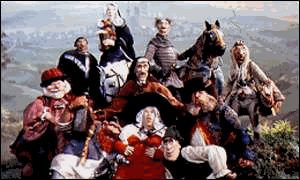

THE CANTERBURY TALES
By Geoffrey Chaucer
Here begins the Prologue
Translated from Middle English
by Louis Francis
Translatorís Note
:Chaucerís own words in the General Prologue, lines 731-735,- ĎWhoso shal telle a tale after a man,/He moot reherce as ny as evere he kan/Everich a word, if it be in his charge,/Al speke he never so rudeliche and large,/Or ellis he moot telle his tale untrewe. [ Who tells a tale told by another man,/He must tell it, truthfully as he can/Every such word as well he might recall,/They might be rude, licentious; tell them all,/Else he will falter with a tale untrue.] Therein lies the true dichotomy of the whole work: between the prologue and the actual tales themselves; between Chaucerís own voice and that Ďafter another maní. Middle English is an amalgam of common Anglo-Saxon, court French and Latin derivatives and should really be regarded as a quasi-foreign language For the translator of Middle English and particularly of the Canterbury Tales, there is also a dichotomy; between a literary entity or a Ďbardicí reality. For whom did Chaucer write? For those literate enough to read his words directly or, as an audience, to listen second-hand? To make a scholarly, painstakingly literate translation or to try and capture the innate spirit of what is said and what is described?
For the purpose of this translation, the general prologue is treated as bardic in intent, being Chaucerís own wry observations of the contemporary social parade. This being so, while the decasyllabic line structure and couplet rhyming are strictly observed, where the iambic sub-structure might conflict with any vernacular intent, it is not always enforced. For the same reason, mediaeval euphemisms and slang, where obscure, are given a modern equivalent and terminal vowel soundings are always elided. Thus it is hoped that the spirit of what is evoked in the original is more realistically captured in the translated text. The intention of this translation is as much an interpretation as a scholastic endeavour. Thus the agonising for poetical perfection has been avoided in the interests of telling an enchanting story. For it must be remembered that, in Chaucerís time, written poetry did not exist, per se, whereas bardic, real-time performances had a long and honoured history.
PROCEED WITH TRANSLATED TEXT